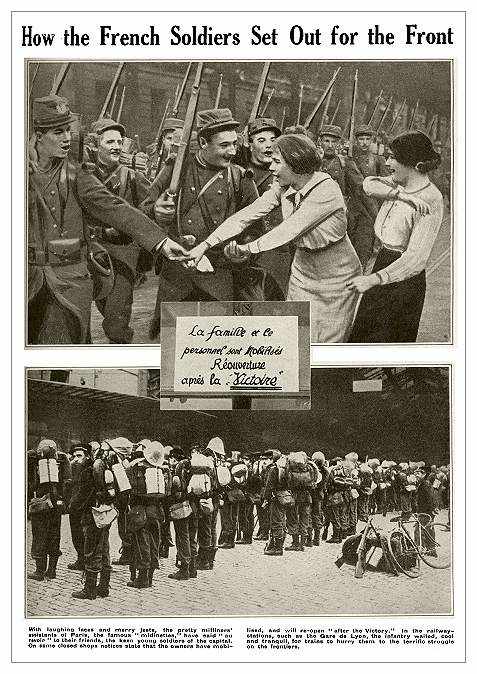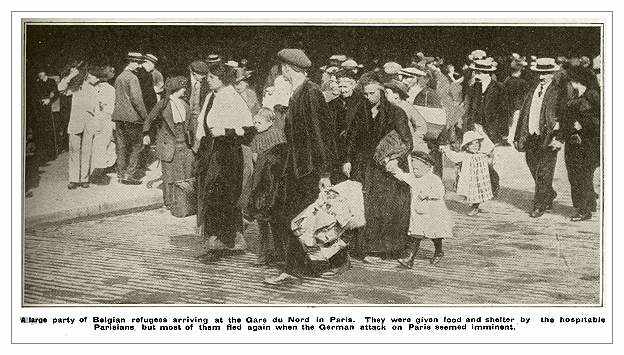Paris in War Time
From the book : ‘With the Allies’
by Richard Harding Davis (1915)
Paris in War Time
CHAPTER IV
THOSE who, when the Germans approached, fled from Paris, described it as a city doomed, as a waste place, desolate as a graveyard. Those who run away always are alarmists. They are on the defensive. They must explain why they ran away.
Early in September Paris was like a summer hotel out of season. The owners had temporarily closed it; the windows were barred, the furniture and paintings draped in linen, a caretaker and a night-watchman were in possession.
It is an old saying that all good Americans go to Paris when they die. Most of them take no chances and prefer to visit it while they are alive. Before this war, if the visitor was disappointed, it was the fault of the visitor, not of Paris. She was all things to all men. To some she offered triumphal arches, statues, paintings; to others by day racing, and by night Maxims and the Rat Mort. Some loved her for the book-stalls along the Seine and ate lien of the Latin Quarter; some for her parks, forests, gardens, and boulevards; some because of the Luxembourg; some only as a place where everybody was smiling, happy, and polite, where they were never bored, where they were always young, where the lights never went out and there was no early call. Should they to-day revisit her they would find her grown grave and decorous, and going to bed at sundown, but still smiling bravely, still polite.
You cannot wipe out Paris by removing two million people and closing Cartier's and the Cafe' de Paris. There still remains some hundred miles of boulevards, the Seine and her bridges, the Arc de Triomphe, with the sun setting behind it, and the Gardens of the Tuilleries. You cannot send them to the store-house or wrap them in linen. And the spirit of the people of Paris you cannot crush nor stampede.
Between Paris in peace and Paris to-day the most striking difference is lack of population. Idle rich; the employees of the government, and tourists of all countries are missing. They leave a great emptiness. when you walk the streets you feel either that you are up very early, before any one is awake, or that you are in a boom town from which the boom has departed.
On almost every one of the noted shops "Fermé"' is written, or it has been turned over to the use of the Red Cross. Of the smaller shops those that remain open] are chiefly bakeshops and chemists, but no man need go naked or hungry; in every block he will find at least one place where he can be clothed and fed. But the theatres are all closed. No one is in a mood to laugh, and certainly no one wishes to consider anything more serious than the present crisis. So there are no revues, operas, or comedies.
The thing you missed perhaps most were the children in the Avenue des Champs Elysés. For generations over that part of the public garden the children have held sway. They knew it belonged to them, and into the gravel walks drove their tin spades with the same sense of ownership as at Deauville they dig up the shore. Their straw hats and bare legs, their Normandy nurses, with enormous head-dresses, blue for a boy and pink for a girl were, of the sights of Paris one of the most familiar. And when the children vanished they left a dreary wilderness. You could look for a mile, from the Place de la Concorde to the Arc de Triomphe, and not see a child. The stalls, where they bought hoops and skipping-ropes, the flying wooden horses, Punch-and-Judy shows, booths where with milk they refreshed themselves and with bonbons made themselves ill, all were deserted and boarded up.
The closing down of the majority of the shops and hotels was not due to a desire on the part of those employed in them to avoid the, Germans; but to get at the Germans.
On shop after shop are signs reading: "The proprietor and staff are with the colors," or "The personnel of this establishment is mobilized," or "Monsieur informs his clients that he is with his regiment."
In the absence of men at the front, French-women, at all times capable and excellent managers, have surpassed themselves. In my hotel there were employed seven women and one man. In another hotel I visited the entire staff was composed of women.
An American banker offered his twenty-two polo ponies to the government. They were refused as not heavy enough. He did not know that, and supposed he had lost them. Later he learned from the wife of his trainer, a Frenchwoman, that those employed in his stables at Versailles who had not gone to the front at the approach of the Germans had fled, and that for three weeks his string of twenty-two hones had been fed, groomed, and exercised by the trainer's wife and her two little girls.
To an American it was very gratifying to hear the praise of the French and English for the American ambulance at Neuilly. It is the outgrowth of the American hospital, and at the start of this war was organized by Mrs. Herrick, wife of our ambassador, and other ladies of the American colony in Paris, and the American doctors. They took over the Lycée Pasteur, an enormous school at Neuilly, that had just been finished and never occupied, and converted it into what is a most splendidly equipped hospital. In walking over the building you find it hard to believe that it was intended for any other than its present use. The operating rooms, kitchens, wards, rooms for operating by Roentgen rays, and even a chapel have been installed.
The organization and system are of the highest order. Every one in it is American. The doctors are the best in Paris. The nurses and orderlies are both especially trained for the work and volunteers. The spirit of helpfulness and unselfishness is everywhere apparent. Certain members of the American colony, who never in their lives thought of any one save themselves, and of how to escape boredom, are toiling like chambermaids and hall porters, performing most disagreeable tasks, not for a few hours a week, but unceasingly, day after day. No task is too heavy for them or too squalid. They help all alike - Germans, English, major-generals, and black Turcos.
There are three hundred patients. The staff of the hospital numbers one hundred and fifty. It is composed of the best-known American doctors in Paris and a few from New York. Among the volunteer nurses and attendants are wives of bankers in Paris, American girls who have married French titles, and girls who since the war came have lost employment as teachers of languages, stenographers, and governesses. The men are members of the Jockey Club, art students, medical students, clerks, and boulevardiers. They are all working together in most admirable harmony and under an organization that in its efficiency far surpasses that of any other hospital in Paris. Later it is going to split the American colony in twain. If you did not work in the 'American Ambulance’ you won't belong.
Attached to the hospital is a squadron of automobile ambulances, ten of which were presented by the Ford Company and ten purchased. Their chassis have been covered with khaki hoods and fitted to carry two wounded men and attendants. On their runs they are accompanied by automobiles with medical supplies, tires, and gasoline. The ambulances scout at the rear of the battle line and carry back those which the field- hospitals cannot handle.
One day I watched the orderlies who accompany these ambulances handling about forty English wounded, transferring them from the automobiles to the reception hall, and the smartness and intelligence with which the members of each crew worked together was like that of a champion polo team. The editor of a London paper, who was in Paris investigating English hospital conditions, witnessed the same performance, and told me that in handling the wounded it surpassed in efficiency anything he had seen.

